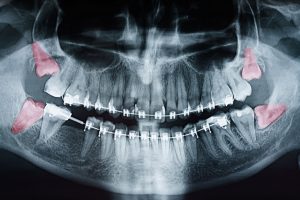Fascination About Wisdom Teeth Holes
Overview Wisdom tooth extraction is an effective surgical procedure to remove one or more wisdom teeth the four adult teeth located on bottom and top. If a wisdom tooth doesn't have space to develop (impacted wisdom tooth), resulting in pain, illness or other dental problems, you will likely need to have it pulled.
To prevent potential future difficulties, a few dentists and dental surgeons advocate wisdom tooth extraction even if impacted teeth are not currently causing problems. Why it's done jagged teeth, or third molars, would be the final permanent teeth to appear (erupt) from the mouth. These teeth generally appear between the ages of 17 and 25.
For others, wisdom teeth cause no issues and erupt normally just as their additional molars did. Wisdom teeth that don't have sufficient space to erupt into the mouth or develop are developed by men and women. Wisdom teeth may erupt only partially or in any way. An impacted wisdom tooth may: Grow in an angle toward another tooth (second molar) Grow at an angle toward the rear of your mouth Grow at a ideal angle to the other teeth, like the wisdom tooth is"lying down" within the jawbone Grow straight up or down just like other teeth however stay trapped inside the jawbone Issues with impacted wisdom teeth You will probably want your impacted wisdom tooth pulled in case it contributes to problems such as: Pain Trapping debris and food supporting the wisdom tooth Infection or gum disease (periodontal disease) Tooth decay in a partially erupted wisdom tooth Damage into a nearby tooth or surrounding bone Development of an fluid-filled sac (cyst) round the wisdom tooth problems together with dental treatments to straighten other teeth Preventing future dental problems Dental specialists disagree about the value of pulling impacted wisdom teeth which are not causing problems (asymptomatic).

However, removal of wisdom teeth sometimes takes a surgical procedure which involves making an incision in the gum tissue and removing bone. Rarely, complications may include: Painful sterile socket, or exposure of bone when the post-surgical blood clot has been lost from the website of the operative wound (socket) Infection in the socket out of bacteria or trapped food particles Damage to neighboring teeth, nerves, jawbone or sinuses How you prepare Your dentist may perform the procedure in the office.
In addition to making the region with local anesthetic, your physician may indicate sedation to enable you to be more comfortable throughout the procedure. Questions to ask Questions you may choose to ask your physician or oral surgeon include: How many wisdom teeth need to be eliminated What type of anesthesia will I receive How complicated can you expect the process to be How long is the process likely to survive Have the impacted wisdom teeth caused damage to other teeth Is there a threat that I could have nerve damage What additional dental treatments may I need at a subsequent date How much time does it take to fully cure and return to regular activity Preparing for surgery A wisdom tooth extraction is almost always done as an inpatient procedure.

Not known Facts About Wisdom Teeth Anesthesia
You will receive directions from the hospital or practice staff on the day of your scheduled operation and also what to do prior to the surgery. Ask these questions: Will I want to make arrangements for somebody to drive me home after the procedure When do I need to reach the dental clinic or hospital Do I need to stop eating meals or drinking fluids or both (quickly ) If yes, when do I begin Can I choose my prescription medications before the operation If so, how long prior to the operation can I choose a dose Should I avoid any nonprescription drugs try these out before the operation next page What you can anticipate During the procedure The dentist or oral surgeon may use among three types of anesthesia, based on the expected complexity of the wisdom tooth extraction and your comfort level.

Your awareness is suppressed by sedation anesthesia during the procedure. You do not feel some pain and will have memory of the process. General anesthesia. In special circumstances, you may be offered anesthesia.